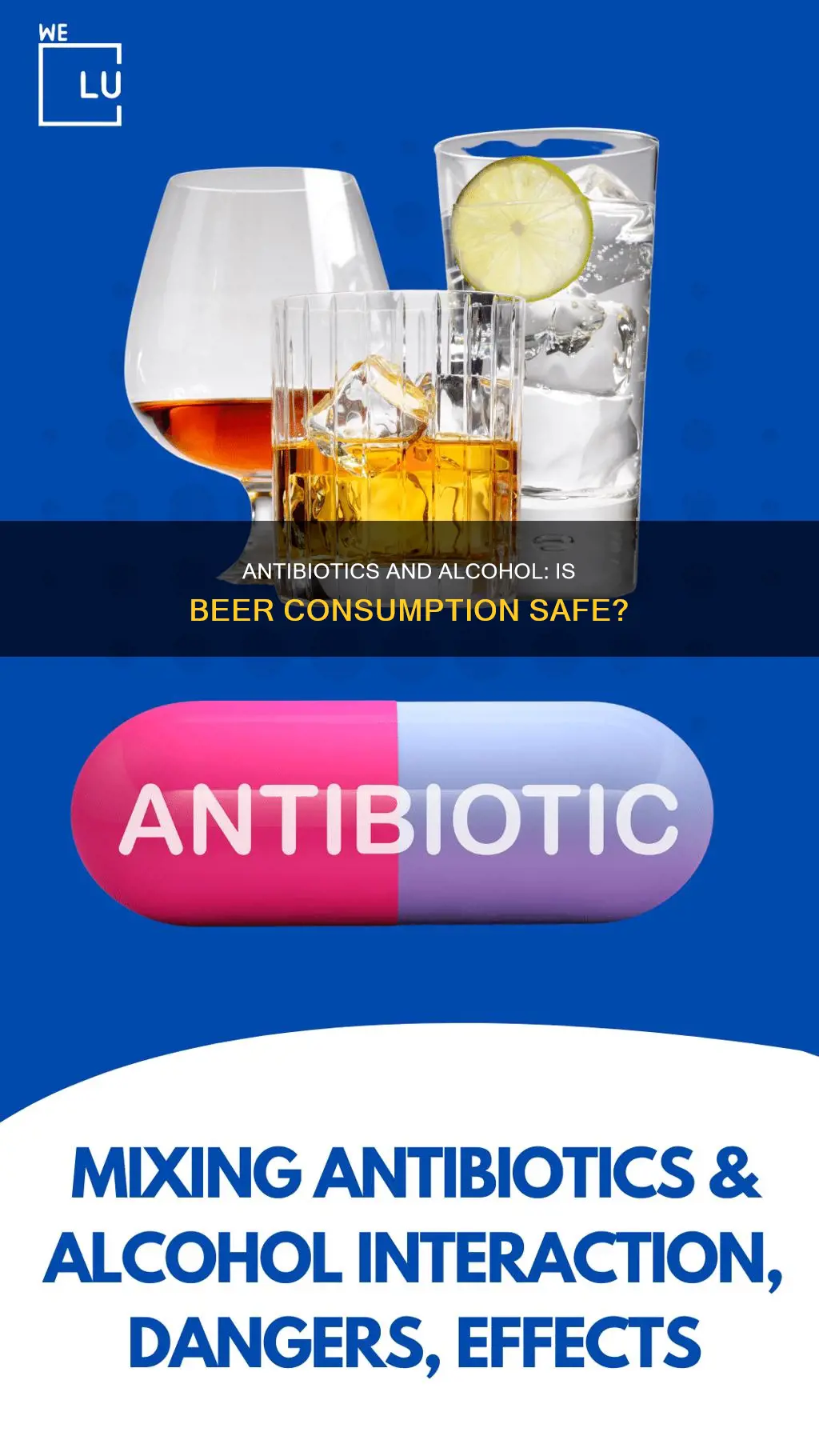
Drinking alcohol while taking antibiotics is generally not recommended due to the potential risks and side effects. Alcohol can negatively impact the body's ability to heal and recover from an infection, as it can cause dehydration, digestive issues, and sleep disturbances. Additionally, mixing alcohol with certain antibiotics may lead to increased side effects, such as nausea, vomiting, and liver damage. It is always best to consult with a doctor or pharmacist before consuming alcohol while taking any medication, including antibiotics, as they can advise based on individual health factors and the specific antibiotic being taken.
| Characteristics | Values |
|---|---|
| Effect on antibiotic effectiveness | Alcohol does not usually make antibiotics less effective, but it can interfere with their absorption in the body. |
| Effect on recovery | Alcohol can slow down recovery by causing dehydration, digestive issues, and sleep disruption. |
| Effect on immune system | Alcohol can weaken the immune system, making it harder to recover from an infection. |
| Side effects | Alcohol can increase the risk and severity of side effects such as drowsiness, dizziness, digestive issues, nausea, vomiting, and liver damage. |
| Safe antibiotics to mix with alcohol | Penicillins, sulfonamides, oxazolidinones, tetracyclines, and some fluoroquinolones. |
| Antibiotics to avoid mixing with alcohol | Metronidazole, tinidazole, isoniazid, linezolid, cefoperazone, cefotetan, and ketoconazole. |
| Recommendations | Consult a doctor or pharmacist before mixing alcohol with antibiotics. Avoid alcohol until the antibiotic treatment is completed. |
What You'll Learn
- Drinking alcohol while on antibiotics can cause side effects like nausea and vomiting
- Alcohol can interfere with your body's ability to absorb antibiotics, reducing their effectiveness
- Alcohol can cause dehydration and sleep disruption, hindering the recovery process
- Some antibiotics, like Metronidazole, have dangerous interactions with alcohol
- Alcohol can negatively impact the immune system, making it harder to fight infections

Drinking alcohol while on antibiotics can cause side effects like nausea and vomiting
Drinking alcohol while on antibiotics is generally not recommended, as it can increase your chance of experiencing certain side effects. While alcohol usually does not affect the effectiveness of most antibiotics, consuming it while you're fighting an infection may cause dehydration, digestive problems such as nausea and vomiting, interrupt normal sleep, and hinder your body's ability to heal.
Nausea and vomiting are among the most common side effects associated with mixing alcohol and antibiotics. Other possible side effects include stomach pain, flushing of the skin, diarrhoea, and ulcers. In more severe cases, drinking alcohol with certain antibiotics can lead to liver damage or a "disulfiram-like reaction", which includes symptoms such as abdominal cramps, vomiting, and difficulty breathing.
It is important to note that the specific side effects can vary depending on the type of antibiotic and your overall health status. Therefore, it is always advisable to consult your doctor or pharmacist before consuming alcohol while taking any medication, including antibiotics. They can provide guidance based on your specific circumstances and the particular antibiotic you are taking.
Additionally, it is worth mentioning that alcohol can be found not only in beverages like beer, wine, and liquor but also in some mouthwashes and cold medications. Therefore, checking ingredient labels and consulting your healthcare provider is crucial to ensuring safe consumption.
Beer Belly Blues: Why Beer Upsets Your Stomach
You may want to see also

Alcohol can interfere with your body's ability to absorb antibiotics, reducing their effectiveness
While mixing alcohol and antibiotics is not advisable, it is a common misconception that drinking while on these medications is relatively safe. Alcohol can directly inhibit the effectiveness of antibiotics and cause a wide range of negative side effects.
Drinking alcohol while taking antibiotics can interfere with your body's ability to absorb antibiotics, making them less effective. Alcohol is metabolized (broken down) in the liver by enzymes. Some drugs are also metabolized by the same or similar enzymes. Depending on how often and how much alcohol is consumed, changes in these enzymes may alter how drugs are broken down in your body. For example, when a large amount of alcohol is consumed over a short period, certain enzymes in your body do not work as well to break down the drug for metabolism. The levels of the antibiotic in the body may increase because it is not fully metabolized and excreted, which could lead to greater drug toxicity and side effects.
Additionally, alcohol can affect how some antibiotics are metabolized in the body for elimination. This could lower the effectiveness of the antibiotic or increase its toxicity. For instance, erythromycin ethylsuccinate, a type of antibiotic, has been found to be affected by alcohol consumption. Alcohol leads to slowed "gastric emptying" when combined with this antibiotic, which may delay the absorption of the antibiotic into the bloodstream and lower its effect.
Furthermore, alcohol can cause dehydration and digestive issues, which can be particularly problematic for those taking antibiotics. Antibiotics can cause common side effects such as drowsiness, dizziness, and digestive issues, all of which can be magnified by drinking alcohol.
Therefore, it is generally recommended to avoid alcohol while taking antibiotics to ensure optimal absorption and effectiveness of the medication, as well as to minimize potential side effects.
Beer and Seizure Medicine: What You Need to Know
You may want to see also

Alcohol can cause dehydration and sleep disruption, hindering the recovery process
Alcohol consumption can cause dehydration and sleep disruption, which can hinder the recovery process when taking antibiotics. Alcohol is a diuretic, which increases urine production and causes the body to remove fluids more quickly. This can lead to dehydration, especially if one does not consume enough water alongside alcoholic drinks. Dehydration can cause dizziness, headaches, and a decrease in blood volume, affecting the delivery of oxygen and nutrients to the brain.
Additionally, alcohol can disrupt the sleep cycle and reduce sleep quality. It can alter the sleep architecture, leading to more deep sleep and less REM sleep initially, followed by an increase in light sleep later in the night. This can result in frequent wakings and fragmented sleep. Alcohol can also interfere with circadian rhythms, affecting the body's sensitivity to cues such as daylight and darkness, which regulate the sleep-wake cycle.
The combination of dehydration and sleep disruption can hinder the recovery process when taking antibiotics. Adequate sleep and hydration are crucial for the body to heal and recover from sickness or infection. Alcohol can interfere with these factors, slowing down the recovery process and prolonging the duration of illness. Therefore, it is generally recommended to avoid consuming alcohol while taking antibiotics to optimize the healing process.
To minimize the negative impacts of alcohol on the body, it is essential to drink in moderation and stay hydrated by consuming water or electrolyte-rich fluids. However, when taking antibiotics, it is advisable to follow the recommendations of one's doctor or pharmacist regarding alcohol consumption to avoid any potential drug interactions or side effects.
Millenials' Work Culture: Beer on the Job?
You may want to see also

Some antibiotics, like Metronidazole, have dangerous interactions with alcohol
While mixing moderate amounts of alcohol with antibiotics will not usually lower the effectiveness of the antibiotic, it is still not recommended. Alcohol can still hinder your body's ability to heal itself by causing dehydration, digestive problems, and sleep disruption.
In addition to the disulfiram-like reaction, Metronidazole may also lead to central nervous system (CNS) side effects when combined with alcohol. Both alcohol and Metronidazole are central nervous system depressants, and their combined effects can be dangerous when performing activities that require concentration, such as driving or operating machinery.
It is important to always check with your doctor or pharmacist before mixing alcohol with any medication, as there may be dangerous interactions or side effects.
Drinking Beer on Siesta Key Beach: What's Allowed?
You may want to see also

Alcohol can negatively impact the immune system, making it harder to fight infections
Drinking alcohol while taking antibiotics can also lead to a range of side effects, including digestive problems, such as stomach pain, diarrhea, and ulcers. It can also cause flushing, which is the reddening and warming of the skin. In more severe cases, alcohol can cause liver damage, such as cirrhosis, and increase the risk of developing another infection.
Additionally, alcohol can interfere with the absorption of some antibiotics, making them less effective. It can also increase the blood concentration of certain antibiotics, leading to greater drug toxicity and side effects. This is especially true for antibiotics such as metronidazole and tinidazole, which can cause a "disulfiram-like reaction" when combined with alcohol. This reaction can result in abdominal cramps, nausea, vomiting, difficulty breathing, and other serious symptoms.
Even moderate alcohol consumption can reduce energy levels and delay recovery, so it is generally recommended to avoid alcohol while taking antibiotics to ensure optimal healing and recovery.
Beer and Dexamethasone: Is It Safe?
You may want to see also
Frequently asked questions
No, it is not recommended to drink beer or any other form of alcohol while taking antibiotics. Alcohol can reduce your energy and delay recovery, and it can also cause a range of negative side effects, including digestive issues, drowsiness, dizziness, nausea, and vomiting.
The side effects of drinking alcohol while on antibiotics can include:
- Increased feelings of nausea
- Hindrance of cognitive function, concentration, and coordination
- Dehydration
- Disruption of sleep
- Lowered immune response
- Liver damage
- Diarrhea
- Dizziness
- Drowsiness
- Headache
- Potentially life-threatening seizures
It is best to wait until you have completed your course of antibiotics before consuming alcohol. For some antibiotics, such as Metronidazole and Tinidazole, it is recommended to refrain from drinking alcohol for at least 72 hours after finishing the medication.
Yes, you can opt for non-alcoholic drinks, also known as "mocktails." These drinks can be fun and refreshing, and they won't interfere with your antibiotic treatment.







